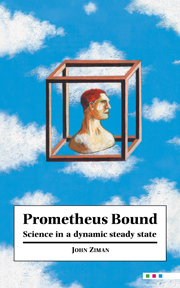Book contents
- Frontmatter
- Contents
- Preface
- 1 What is happening to science?
- 2 Scientific and technological progress
- 3 Sophistication and collectivization
- 4 Transition to a new regime
- 5 Allocation of resources
- 6 Institutional responses to change
- 7 Scientific careers
- 8 Science without frontiers
- 9 Steering through the buzzword blizzard
- Further reading
- Index
9 - Steering through the buzzword blizzard
Published online by Cambridge University Press: 05 August 2012
- Frontmatter
- Contents
- Preface
- 1 What is happening to science?
- 2 Scientific and technological progress
- 3 Sophistication and collectivization
- 4 Transition to a new regime
- 5 Allocation of resources
- 6 Institutional responses to change
- 7 Scientific careers
- 8 Science without frontiers
- 9 Steering through the buzzword blizzard
- Further reading
- Index
Summary
So the greedy peasant took a sharp knife and cut open the goose that laid the golden eggs.
A game with moving goal posts
We began this book with the visible evidence that science was passing through a period of radical structural change. Subsequent chapters presented a deeper analysis of the origins and extent of this change, showing in detail how it affects every aspect of scientific life and work. To give substance to the analysis, I have focussed on the UK, where a transition to quite a new regime started in the mid-1970s, and is still going on. But the history of UK science in recent years is only part of a larger story, involving scientific activity throughout the world. Science has always been a multinational cultural form. The same forces for change are at work everywhere, and many of the same features have emerged in other countries.
The notion that a distinctive new regime is emerging may be too simple. In some countries, the transformation process is apparently only beginning, and may take a different turn. Everywhere, the scientific world still seems like the Irishman's impression of New York: ‘Sure, it'll be a fine city when it's finished.’ On the other hand, scientific activity is becoming increasingly transnational, both for general political and economic reasons and in response to the pressures of the ‘steady state’. UK science, for example, is now inextricably caught up in the complex of interconnected institutions that is developing in Europe.
- Type
- Chapter
- Information
- Prometheus Bound , pp. 249 - 276Publisher: Cambridge University PressPrint publication year: 1994



